外研版(2019)高中英语必修3课件:Unit 1 Knowing me, knowing you Developing ideas(48张ppt)
文档属性
| 名称 | 外研版(2019)高中英语必修3课件:Unit 1 Knowing me, knowing you Developing ideas(48张ppt) | 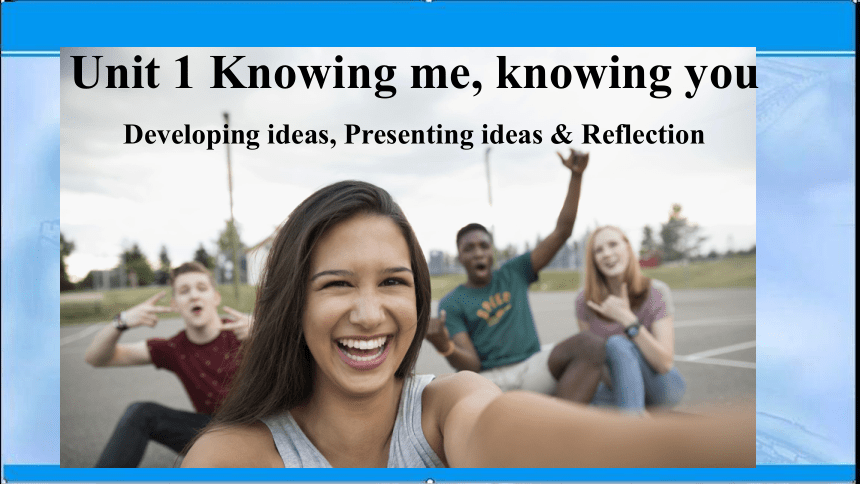 | |
| 格式 | ppt | ||
| 文件大小 | 2.6MB | ||
| 资源类型 | 教案 | ||
| 版本资源 | 外研版(2019) | ||
| 科目 | 英语 | ||
| 更新时间 | 2021-03-28 16:37:51 | ||
图片预览

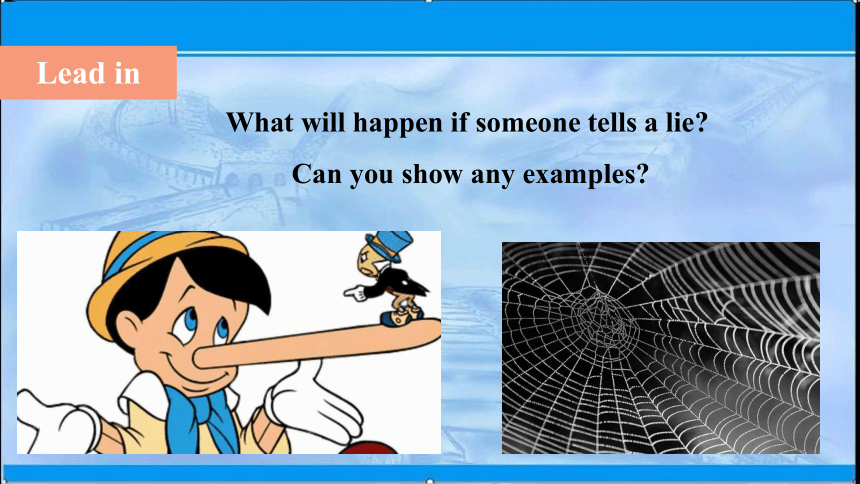
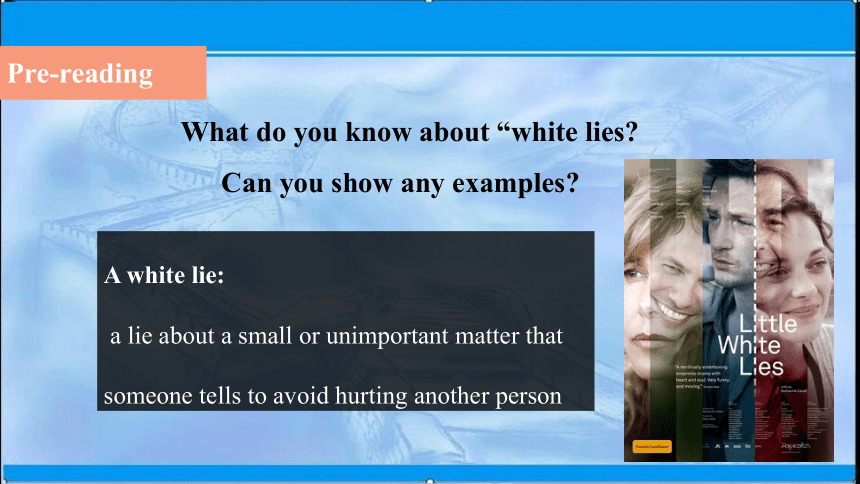
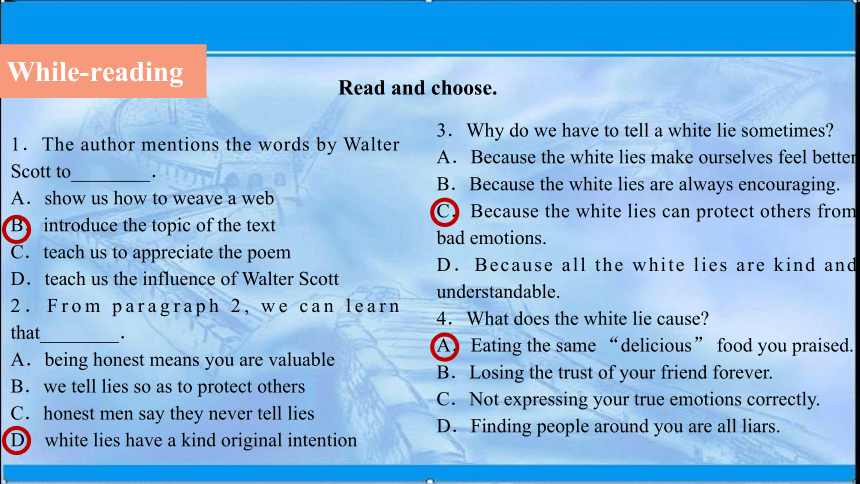
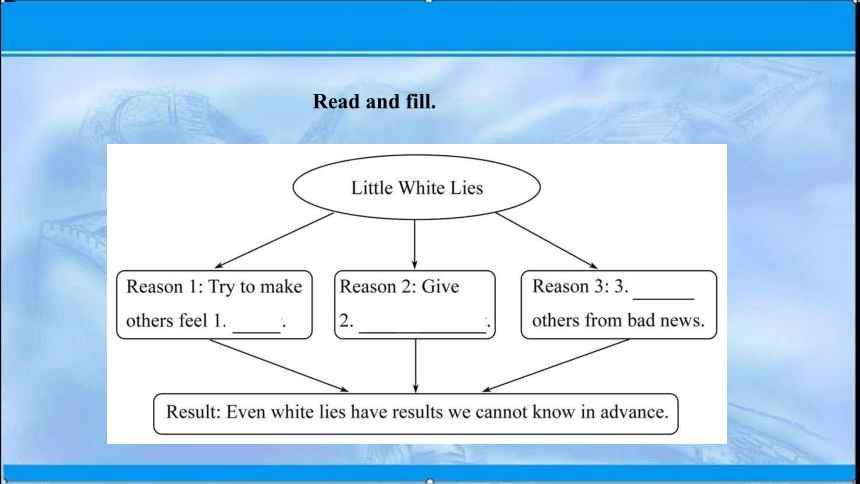
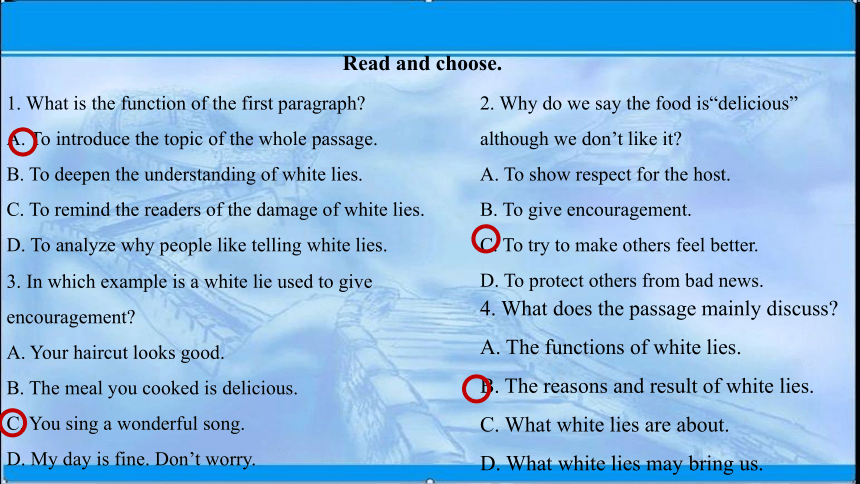
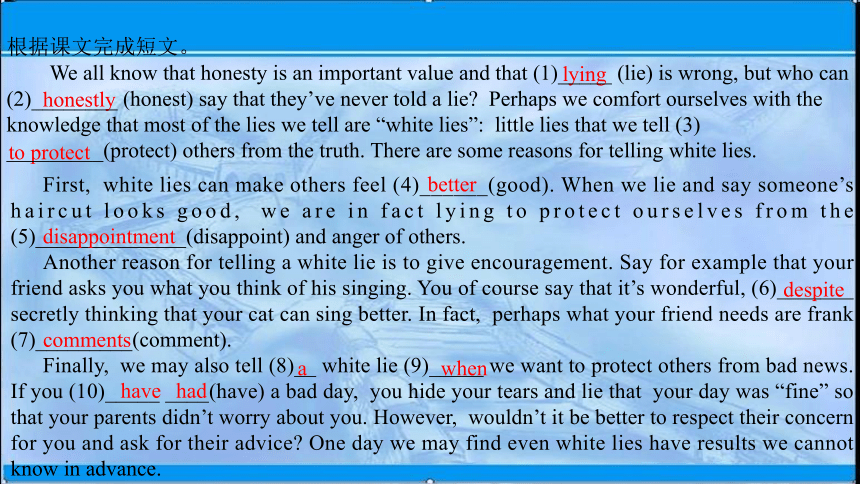
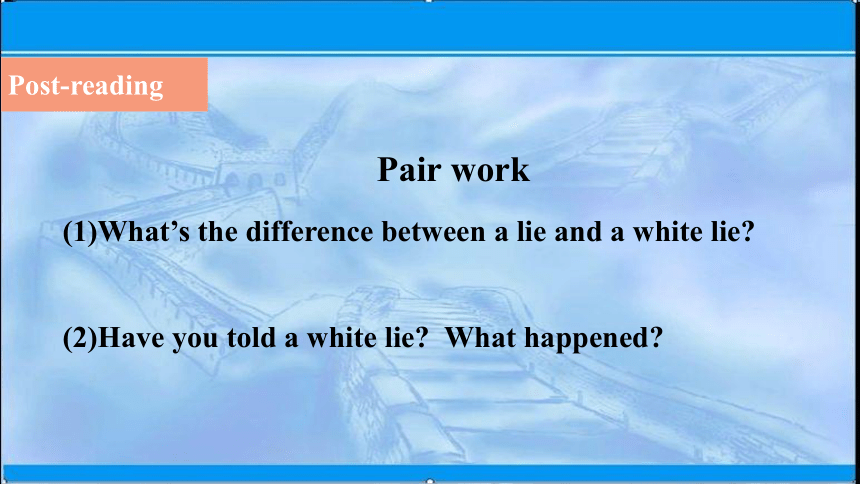
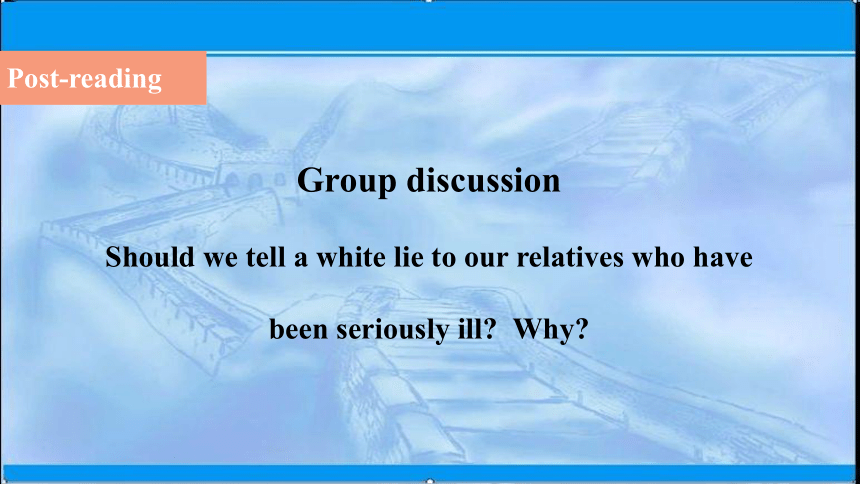
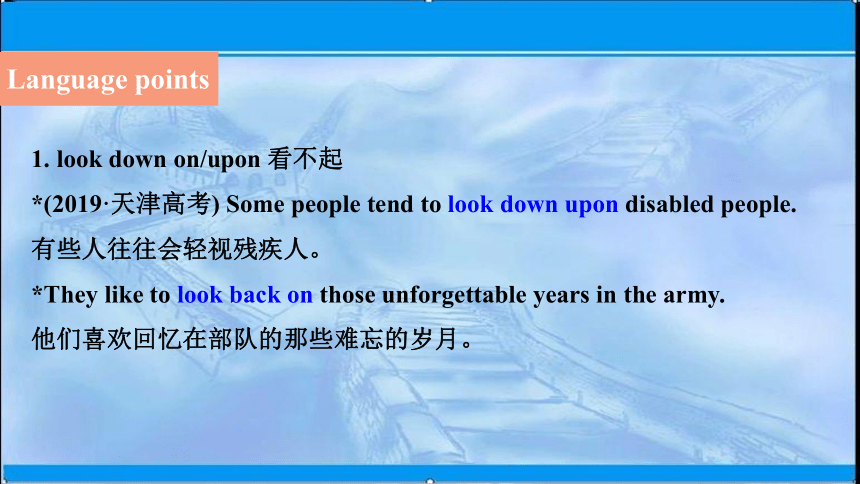
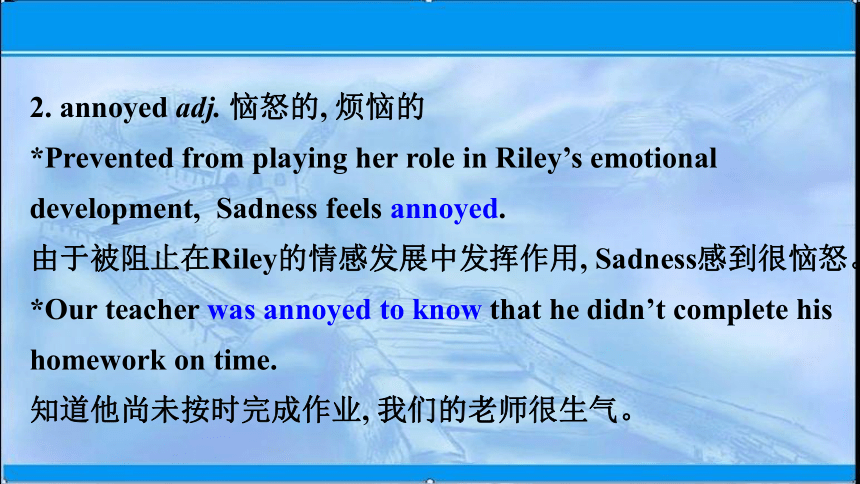
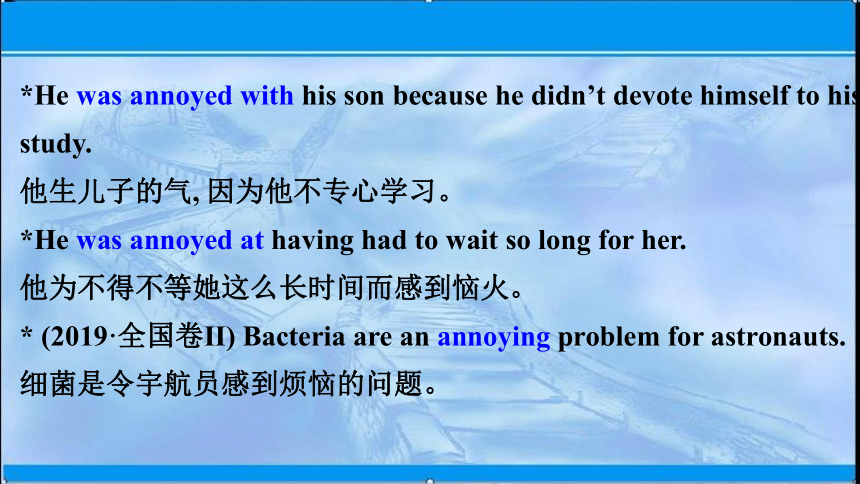
文档简介
Unit 1 Knowing me, knowing you
Developing ideas, Presenting ideas & Reflection
What will happen if someone tells a lie?
Can you show any examples?
Lead in
A white lie:
a lie about a small or unimportant matter that someone tells to avoid hurting another person
What do you know about “white lies?
Can you show any examples?
Pre-reading
1.The author mentions the words by Walter Scott to________.
A.show us how to weave a web
B.introduce the topic of the text
C.teach us to appreciate the poem
D.teach us the influence of Walter Scott
2.From paragraph 2, we can learn that________.
A.being honest means you are valuable
B.we tell lies so as to protect others
C.honest men say they never tell lies
D.white lies have a kind original intention
While-reading
3.Why do we have to tell a white lie sometimes?
A.Because the white lies make ourselves feel better.
B.Because the white lies are always encouraging.
C.Because the white lies can protect others from bad emotions.
D.Because all the white lies are kind and understandable.
4.What does the white lie cause?
A.Eating the same “delicious” food you praised.
B.Losing the trust of your friend forever.
C.Not expressing your true emotions correctly.
D.Finding people around you are all liars.
Read and choose.
Read and fill.
2. Why do we say the food is“delicious” although we don’t like it?
A. To show respect for the host.
B. To give encouragement.
C. To try to make others feel better.
D. To protect others from bad news.
3. In which example is a white lie used to give encouragement?
A. Your haircut looks good.
B. The meal you cooked is delicious.
C. You sing a wonderful song.
D. My day is fine. Don’t worry.
4. What does the passage mainly discuss?
A. The functions of white lies.
B. The reasons and result of white lies.
C. What white lies are about.
D. What white lies may bring us.
1. What is the function of the first paragraph?
A. To introduce the topic of the whole passage.
B. To deepen the understanding of white lies.
C. To remind the readers of the damage of white lies.
D. To analyze why people like telling white lies.
Read and choose.
First, white lies can make others feel (4)______(good). When we lie and say someone’s haircut looks good, we are in fact lying to protect ourselves from the (5)______________(disappoint) and anger of others.
Another reason for telling a white lie is to give encouragement. Say for example that your friend asks you what you think of his singing. You of course say that it’s wonderful, (6)_______ secretly thinking that your cat can sing better. In fact, perhaps what your friend needs are frank (7)_________(comment).
Finally, we may also tell (8)__ white lie (9)_____ we want to protect others from bad news. If you (10)_____ ____(have) a bad day, you hide your tears and lie that your day was “fine” so that your parents didn’t worry about you. However, wouldn’t it be better to respect their concern for you and ask for their advice? One day we may find even white lies have results we cannot know in advance. ?
lying
honestly
to protect
根据课文完成短文。
We all know that honesty is an important value and that (1)_____ (lie) is wrong, but who can
(2)________ (honest) say that they’ve never told a lie? Perhaps we comfort ourselves with the knowledge that most of the lies we tell are “white lies”: little lies that we tell (3) _________(protect) others from the truth. There are some reasons for telling white lies.
better
disappointment
despite
comments
a
when
have
had
Pair work
(1)What’s the difference between a lie and a white lie?
(2)Have you told a white lie? What happened?
Post-reading
Group discussion
Should we tell a white lie to our relatives who have been seriously ill? Why?
Post-reading
1. look down on/upon 看不起
*(2019·天津高考) Some people tend to look down upon disabled people.
有些人往往会轻视残疾人。
*They like to look back on those unforgettable years in the army.
他们喜欢回忆在部队的那些难忘的岁月。
Language points
2. annoyed adj. 恼怒的, 烦恼的
*Prevented from playing her role in Riley’s emotional development, Sadness feels annoyed.
由于被阻止在Riley的情感发展中发挥作用, Sadness感到很恼怒。
*Our teacher was annoyed to know that he didn’t complete his homework on time.
知道他尚未按时完成作业, 我们的老师很生气。
*He was annoyed with his son because he didn’t devote himself to his study.
他生儿子的气, 因为他不专心学习。
*He was annoyed at having had to wait so long for her.
他为不得不等她这么长时间而感到恼火。
* (2019·全国卷Ⅱ) Bacteria are an annoying problem for astronauts.
细菌是令宇航员感到烦恼的问题。
【语块积累】
(1) be/get annoyed with sb. 生某人的气
be annoyed at/about sth. 对某事恼火
be annoyed to do sth. 因做某事而恼火
(2)annoy vt. 使恼怒, 使生气
annoying adj. 令人讨厌的, 恼人的
【巧学助记】语境助记annoy
The teacher was annoyed and asked the annoying student to set down what had happened.
那位老师很恼火, 让那个惹人生气的学生把发生的事情写下来。
【即学即练】
(1)用annoy的正确形式填空
①He was beginning to get very ________ with me
about my carelessness.
②It is ________ that there is no hot water.
③He takes delight in ________ me. ?
annoyed
annoying
annoying
(2)The teacher _______________when the boy refused to answer the question. ?
当那个男孩拒绝回答问题时, 老师很生气。
got very annoyed
3. adjust v. 适应, (使)习惯; 调整
*When Riley moves to a new city, she has a hard time adjusting to her new surroundings.
当莱莉搬到一个新的城市, 她很难适应新环境。
* If fate does not adjust itself to you, adjust yourself to fate.
命运不能迁就你时, 要学会迁就命运。
*(2019·江苏高考)Adjusting to an upright position was quite a challenge.
适应直立行走是个很大的挑战。
*These animals made an adjustment to the new environment in a short time.
这些动物短时间内就适应了新环境。
【语块积累】
(1)adjust . . . to . . . 调整……以适应/适合……
adjust to (doing) sth. 适应/习惯(做)某事
adjust oneself to . . . 使自己适应……
(2)adjustment n. 调整; 适应
make adjustment(s) to 对……作出调整
【知识延伸】表示“适应”的短语常见的有:
adjust (oneself) to adapt (oneself) to
accustom oneself to fit in (with)
【即学即练】
(1)语法填空
①You must learn to adjust yourself __ the country life.
②Some schools will have to make ___________(adjust)
in agreement with the national soccer reform.
③It took the baby a while to adjust to _______(sleep) alone.
to
adjustments
sleeping
(2)句型转换
I’m not sure how she will adjust to retirement.
→I’m not sure how she will _____ ___ __________ __ retirement.
make
an
adjustment
to
4. by accident 偶然, 意外地
*Sadness wants to do her duty but by accident causes the loss of Riley’s happy core memories with Joy.
Sadness想履行自己的职责, 却意外地导致Riley失去了和Joy快乐的核心记忆。
*The pilot, whether by accident or design, made the plane do a sharp turn.
不知是偶然地还是故意地, 那个飞行员让飞机作了一个急转弯。
* I’m sorry I didn’t break the cup on purpose.
很抱歉, 我不是故意打破杯子的。
【语块积累】
by accident=by chance 偶然地; 意外地
by design=on purpose 故意地; 蓄意地
【即学即练】
(1)语法填空
①I found out he was connected with the case ___
accident when a letter fell off his pocket.
②In my opinion, he didn’t hurt you ___ purpose.
(2) Did he do this ___________________or just
_________________? ?
他是故意这么做的还是仅仅出于偶然?
by
on
on purpose/by design
by accident/chance
5. forgive v. 原谅, 宽恕
*Try to forgive someone when they apologise.
当他们道歉时尽量原谅他们。
*He forgave her for what she had said to him.
他原谅她对他说过的那些话。
*They agreed to forgive and forget and be friendly again.
他们答应不计前嫌, 重归于好。
【语块积累】
(1)forgive sb. for (doing) sth. 原谅某人(做)某事
forgive sb. sth. 原谅某人某事
forgive and forget 既往不咎, 不计前嫌
(2)forgiveness n. 原谅
ask/beg for forgiveness 请求原谅
【即学即练】
(1)语法填空
①She has forgiven you ___ the wrongs done to her by you.
②He asked for __________ (forgive) for what he had done wrong.
for
forgiveness
(2)________________________, but I really don’t agree with you. ?
原谅我打断一下, 但我真的不同意你的意见。
Forgive me for interrupting
6. embarrassment n. 尴尬, 难为情
*This can cause embarrassment.
这能导致尴尬。
* Many adolescents should not be too embarrassed about their weight, as long as it is not overweight.
很多青少年不应该对他们的体重感到太尴尬, 只要不是过度肥胖就成。
* I don’t know how to deal with this embarrassing situation.
我不知道如何处理这种尴尬的处境。
* Are you trying to embarrass me by asking such a question?
你问我这样的问题是试图让我难堪吗?
【语块积累】
be embarrassed about 对……感到尴尬
be embarrassed to do sth. 做某事感到尴尬
embarrassing adj. 令人尴尬的, 令人难堪的
embarrass vt. 使尴尬, 使困窘, 使局促不安
【即学即练】用embarrass的适当形式填空
(1)Don’t do wrong things, or you will find the
situation quite ____________.
(2)Many students are supposed to behave honestly,
which will not cause much ______________ certainly.
(3)He didn’t mean ____________you. ?
(4)He was very ___________ to hear people speak
highly of him.
embarrassing
embarrassment
to embarrass
embarrassed
7. independent adj. 独立的
*It was time for her to have a new baby, and it was also time for the young panda to be independent.
该是她生孩子的时候了, 也是小熊猫独立的时候了。
*Americans value independence, even when they’re getting older.
美国人很看重自立, 甚至他们年迈时也是如此。
* I used to be dependent on my parents. Now I’m independent of them.
过去我总是依赖父母, 现在我独立了。
【语块积累】
(1)be independent of 不依赖于
(2)independence n. 独立
dependence n. 依赖, 依靠
(3)dependent adj. 依赖的, 依靠的
be dependent on 依赖, 依靠
(2)Students should aim to _________________________ their teachers.
学生应该努力不依赖老师。
(3)You can’t __________________________all your life. ?
你不能一辈子靠父母生活。
【即学即练】
(1)语法填空
①Now my son is more ___________(dependent); I have more time for myself.
②Find a job and end your ___________ (depend) on your parents. ?
independent
dependence
become more independent of
be dependent on your parents
8. Perhaps the meal you said was “delicious” will be served every time you visit. ?
或许你说的美味的食物你每次去的时候都会端上来。
本句是一个复合句, every time 相当于连词, 引导时间状语从句。
*Every time they went dancing, they ended up in a bad mood.
每次他们去跳舞, 都会不欢而散。
*The first time I handled the problem alone, I felt confused.
我第一次一个人处理问题时, 感到很困惑。
*Next time you come here, remember to return my book.
下次你来这儿时, 记得还我的书。
用作连词的还有: each time, last time, the first time, next time, the moment, the minute等。它们引导时间状语从句, 其后不再加连词。
【即学即练】
(1)Children’s lives are in danger ______________
_____________. ?
孩子们每次过这条马路都面临生命危险。
(2) ______________________________, he was
leaving for Nanjing the next day. ?
上次我去他家拜访时, 他第二天要出发去南京。
every time they
cross this road
Last time I dropped in at his home
9. The more independent you are, the better your life will be. ?
你越独立你的生活就会越好。
(1)该句使用了“the+比较级. . . , the +比较级. . . ”结构, 意为“越……, 就越……”, 表示一方的程度随着另一方的变化而变化, the用在形容词或副词的比较级前。
(2)前一个“the+比较级”通常相当于比较状语从句或条件状语从句, 后一个“the+比较级”通常相当于主句。
(3)在通常情况下, 如果主从句中的谓语动词是系动词be, 而且主语不是代词, be常省略。
*The taller the tree (is), the stronger the wind (is).
树大招风。
*The more books you read, the wiser you will be.
你读的书越多, 你就越聪明。
*The sooner, the better. 越快越好。
(2)At first, I thought I understood what my
teacher said, but the more he explained,
________________________. ?
刚开始, 我还以为我能理解老师说的话。但是,
他越解释, 我就越困惑。
the more confused I became
【即学即练】
(1)______________ you read, __________________
you’ll gain. ?
你读的书越多, 你就会获得越多的知识。
The more books
the more knowledge
寓言读后感
【范文赏析】
The fable is adapted from a work by Schopenhauer, which describes that one cold winter night, a group of porcupines eventually found the ideal distance while managing not to hurt each other with their quills.
Writing
The fable teaches us that there should be boundaries in interpersonal relationships. So in our real life, when dealing with our friends, we should respect their privacy. For example, we shouldn’t read their letters without their permission. In conclusion, only when we keep proper distance can we feel comfortable with each other and our friendship last long as well.
【文体解读】
1. 话题特点
寓言是用比喻性的故事寄托意味深长的道理, 给人以启示的文学体裁。寓言读后感属于议论文, 写作时通常结合寓言阐述的道理, 用生活中的例子加以佐证, 从而得出相关结论。
【布局】
2. 话题词汇
(1)fable n. 寓言
(2)describe vt. 描述
(3)viewpoint n. 观点, 看法
(4)point of view观点
(5)in conclusion总之
(6)in short/brief简言之
(7)in a word总之, 简言之
【课堂练笔】
根据下列寓言, 结合生活实例, 写一篇读后感。
鸽子和蚂蚁
一只蚂蚁到河边饮水, 却不幸掉入河中。一只鸽子看见, 扔下一段树枝, 将他救起。过了不久, 蚂蚁看见猎人正在拿枪瞄准鸽子, 就狠狠地朝他脚上咬了一口, 没让他打中。鸽子非常感激蚂蚁, 从此他们成了好朋友。
【遣词】
1. 不重要的 ___________
2. 平等地 _______
3. 陷入困境 _________?
4. 需要 _________?
5. 作为回报 ________?
6. 不遗余力 ______________?
unimportant
equally
in trouble
in need of
in return
spare no efforts
【造句】
1. 完成句子
(1)一些朋友被认为不重要。
Some friends ________________________. ?
(2)他们能帮我们一把。
They can __________. ?
are considered unimportant
help us out
(3)我们陷入困境。
We’re _________. ?
(4)他们需要帮助。
They _________________help. ?
in trouble
need/are in need of
do what we can/ all that we can
(5)我们应该尽我们所能帮助他们。
We should ___________________________to help them. ?
2. 句式升级
(6)用who引导的定语从句和when引导的时间状语从
句合并句(1)句(2)和句(3)
___________________________________________________________________________
(7)用when引导的时间状语从句合并句(4)和句(5)
________________________________________________________________
Some friends who are considered unimportant can
help us out when we’re in trouble. ?
When they are in need of help, we should do all
that we can to help them. ?
【参考范文】
The fable describes a story between an ant and a dove. The two became good friends by helping each other.
The fable teaches us that some friends who are considered unimportant can help us out when we’re in trouble. So, in our real life, we mustn’t look down on others but treat them equally. When they are in need of help, we should do all that we can to help them. In return, they will spare no efforts to help us. In conclusion, only we adopt such an attitude towards our friends can we make more friends.
Thank You
Unit 1 Knowing me, knowing you
Developing ideas, Presenting ideas & Reflection
What will happen if someone tells a lie?
Can you show any examples?
Lead in
A white lie:
a lie about a small or unimportant matter that someone tells to avoid hurting another person
What do you know about “white lies?
Can you show any examples?
Pre-reading
1.The author mentions the words by Walter Scott to________.
A.show us how to weave a web
B.introduce the topic of the text
C.teach us to appreciate the poem
D.teach us the influence of Walter Scott
2.From paragraph 2, we can learn that________.
A.being honest means you are valuable
B.we tell lies so as to protect others
C.honest men say they never tell lies
D.white lies have a kind original intention
While-reading
3.Why do we have to tell a white lie sometimes?
A.Because the white lies make ourselves feel better.
B.Because the white lies are always encouraging.
C.Because the white lies can protect others from bad emotions.
D.Because all the white lies are kind and understandable.
4.What does the white lie cause?
A.Eating the same “delicious” food you praised.
B.Losing the trust of your friend forever.
C.Not expressing your true emotions correctly.
D.Finding people around you are all liars.
Read and choose.
Read and fill.
2. Why do we say the food is“delicious” although we don’t like it?
A. To show respect for the host.
B. To give encouragement.
C. To try to make others feel better.
D. To protect others from bad news.
3. In which example is a white lie used to give encouragement?
A. Your haircut looks good.
B. The meal you cooked is delicious.
C. You sing a wonderful song.
D. My day is fine. Don’t worry.
4. What does the passage mainly discuss?
A. The functions of white lies.
B. The reasons and result of white lies.
C. What white lies are about.
D. What white lies may bring us.
1. What is the function of the first paragraph?
A. To introduce the topic of the whole passage.
B. To deepen the understanding of white lies.
C. To remind the readers of the damage of white lies.
D. To analyze why people like telling white lies.
Read and choose.
First, white lies can make others feel (4)______(good). When we lie and say someone’s haircut looks good, we are in fact lying to protect ourselves from the (5)______________(disappoint) and anger of others.
Another reason for telling a white lie is to give encouragement. Say for example that your friend asks you what you think of his singing. You of course say that it’s wonderful, (6)_______ secretly thinking that your cat can sing better. In fact, perhaps what your friend needs are frank (7)_________(comment).
Finally, we may also tell (8)__ white lie (9)_____ we want to protect others from bad news. If you (10)_____ ____(have) a bad day, you hide your tears and lie that your day was “fine” so that your parents didn’t worry about you. However, wouldn’t it be better to respect their concern for you and ask for their advice? One day we may find even white lies have results we cannot know in advance. ?
lying
honestly
to protect
根据课文完成短文。
We all know that honesty is an important value and that (1)_____ (lie) is wrong, but who can
(2)________ (honest) say that they’ve never told a lie? Perhaps we comfort ourselves with the knowledge that most of the lies we tell are “white lies”: little lies that we tell (3) _________(protect) others from the truth. There are some reasons for telling white lies.
better
disappointment
despite
comments
a
when
have
had
Pair work
(1)What’s the difference between a lie and a white lie?
(2)Have you told a white lie? What happened?
Post-reading
Group discussion
Should we tell a white lie to our relatives who have been seriously ill? Why?
Post-reading
1. look down on/upon 看不起
*(2019·天津高考) Some people tend to look down upon disabled people.
有些人往往会轻视残疾人。
*They like to look back on those unforgettable years in the army.
他们喜欢回忆在部队的那些难忘的岁月。
Language points
2. annoyed adj. 恼怒的, 烦恼的
*Prevented from playing her role in Riley’s emotional development, Sadness feels annoyed.
由于被阻止在Riley的情感发展中发挥作用, Sadness感到很恼怒。
*Our teacher was annoyed to know that he didn’t complete his homework on time.
知道他尚未按时完成作业, 我们的老师很生气。
*He was annoyed with his son because he didn’t devote himself to his study.
他生儿子的气, 因为他不专心学习。
*He was annoyed at having had to wait so long for her.
他为不得不等她这么长时间而感到恼火。
* (2019·全国卷Ⅱ) Bacteria are an annoying problem for astronauts.
细菌是令宇航员感到烦恼的问题。
【语块积累】
(1) be/get annoyed with sb. 生某人的气
be annoyed at/about sth. 对某事恼火
be annoyed to do sth. 因做某事而恼火
(2)annoy vt. 使恼怒, 使生气
annoying adj. 令人讨厌的, 恼人的
【巧学助记】语境助记annoy
The teacher was annoyed and asked the annoying student to set down what had happened.
那位老师很恼火, 让那个惹人生气的学生把发生的事情写下来。
【即学即练】
(1)用annoy的正确形式填空
①He was beginning to get very ________ with me
about my carelessness.
②It is ________ that there is no hot water.
③He takes delight in ________ me. ?
annoyed
annoying
annoying
(2)The teacher _______________when the boy refused to answer the question. ?
当那个男孩拒绝回答问题时, 老师很生气。
got very annoyed
3. adjust v. 适应, (使)习惯; 调整
*When Riley moves to a new city, she has a hard time adjusting to her new surroundings.
当莱莉搬到一个新的城市, 她很难适应新环境。
* If fate does not adjust itself to you, adjust yourself to fate.
命运不能迁就你时, 要学会迁就命运。
*(2019·江苏高考)Adjusting to an upright position was quite a challenge.
适应直立行走是个很大的挑战。
*These animals made an adjustment to the new environment in a short time.
这些动物短时间内就适应了新环境。
【语块积累】
(1)adjust . . . to . . . 调整……以适应/适合……
adjust to (doing) sth. 适应/习惯(做)某事
adjust oneself to . . . 使自己适应……
(2)adjustment n. 调整; 适应
make adjustment(s) to 对……作出调整
【知识延伸】表示“适应”的短语常见的有:
adjust (oneself) to adapt (oneself) to
accustom oneself to fit in (with)
【即学即练】
(1)语法填空
①You must learn to adjust yourself __ the country life.
②Some schools will have to make ___________(adjust)
in agreement with the national soccer reform.
③It took the baby a while to adjust to _______(sleep) alone.
to
adjustments
sleeping
(2)句型转换
I’m not sure how she will adjust to retirement.
→I’m not sure how she will _____ ___ __________ __ retirement.
make
an
adjustment
to
4. by accident 偶然, 意外地
*Sadness wants to do her duty but by accident causes the loss of Riley’s happy core memories with Joy.
Sadness想履行自己的职责, 却意外地导致Riley失去了和Joy快乐的核心记忆。
*The pilot, whether by accident or design, made the plane do a sharp turn.
不知是偶然地还是故意地, 那个飞行员让飞机作了一个急转弯。
* I’m sorry I didn’t break the cup on purpose.
很抱歉, 我不是故意打破杯子的。
【语块积累】
by accident=by chance 偶然地; 意外地
by design=on purpose 故意地; 蓄意地
【即学即练】
(1)语法填空
①I found out he was connected with the case ___
accident when a letter fell off his pocket.
②In my opinion, he didn’t hurt you ___ purpose.
(2) Did he do this ___________________or just
_________________? ?
他是故意这么做的还是仅仅出于偶然?
by
on
on purpose/by design
by accident/chance
5. forgive v. 原谅, 宽恕
*Try to forgive someone when they apologise.
当他们道歉时尽量原谅他们。
*He forgave her for what she had said to him.
他原谅她对他说过的那些话。
*They agreed to forgive and forget and be friendly again.
他们答应不计前嫌, 重归于好。
【语块积累】
(1)forgive sb. for (doing) sth. 原谅某人(做)某事
forgive sb. sth. 原谅某人某事
forgive and forget 既往不咎, 不计前嫌
(2)forgiveness n. 原谅
ask/beg for forgiveness 请求原谅
【即学即练】
(1)语法填空
①She has forgiven you ___ the wrongs done to her by you.
②He asked for __________ (forgive) for what he had done wrong.
for
forgiveness
(2)________________________, but I really don’t agree with you. ?
原谅我打断一下, 但我真的不同意你的意见。
Forgive me for interrupting
6. embarrassment n. 尴尬, 难为情
*This can cause embarrassment.
这能导致尴尬。
* Many adolescents should not be too embarrassed about their weight, as long as it is not overweight.
很多青少年不应该对他们的体重感到太尴尬, 只要不是过度肥胖就成。
* I don’t know how to deal with this embarrassing situation.
我不知道如何处理这种尴尬的处境。
* Are you trying to embarrass me by asking such a question?
你问我这样的问题是试图让我难堪吗?
【语块积累】
be embarrassed about 对……感到尴尬
be embarrassed to do sth. 做某事感到尴尬
embarrassing adj. 令人尴尬的, 令人难堪的
embarrass vt. 使尴尬, 使困窘, 使局促不安
【即学即练】用embarrass的适当形式填空
(1)Don’t do wrong things, or you will find the
situation quite ____________.
(2)Many students are supposed to behave honestly,
which will not cause much ______________ certainly.
(3)He didn’t mean ____________you. ?
(4)He was very ___________ to hear people speak
highly of him.
embarrassing
embarrassment
to embarrass
embarrassed
7. independent adj. 独立的
*It was time for her to have a new baby, and it was also time for the young panda to be independent.
该是她生孩子的时候了, 也是小熊猫独立的时候了。
*Americans value independence, even when they’re getting older.
美国人很看重自立, 甚至他们年迈时也是如此。
* I used to be dependent on my parents. Now I’m independent of them.
过去我总是依赖父母, 现在我独立了。
【语块积累】
(1)be independent of 不依赖于
(2)independence n. 独立
dependence n. 依赖, 依靠
(3)dependent adj. 依赖的, 依靠的
be dependent on 依赖, 依靠
(2)Students should aim to _________________________ their teachers.
学生应该努力不依赖老师。
(3)You can’t __________________________all your life. ?
你不能一辈子靠父母生活。
【即学即练】
(1)语法填空
①Now my son is more ___________(dependent); I have more time for myself.
②Find a job and end your ___________ (depend) on your parents. ?
independent
dependence
become more independent of
be dependent on your parents
8. Perhaps the meal you said was “delicious” will be served every time you visit. ?
或许你说的美味的食物你每次去的时候都会端上来。
本句是一个复合句, every time 相当于连词, 引导时间状语从句。
*Every time they went dancing, they ended up in a bad mood.
每次他们去跳舞, 都会不欢而散。
*The first time I handled the problem alone, I felt confused.
我第一次一个人处理问题时, 感到很困惑。
*Next time you come here, remember to return my book.
下次你来这儿时, 记得还我的书。
用作连词的还有: each time, last time, the first time, next time, the moment, the minute等。它们引导时间状语从句, 其后不再加连词。
【即学即练】
(1)Children’s lives are in danger ______________
_____________. ?
孩子们每次过这条马路都面临生命危险。
(2) ______________________________, he was
leaving for Nanjing the next day. ?
上次我去他家拜访时, 他第二天要出发去南京。
every time they
cross this road
Last time I dropped in at his home
9. The more independent you are, the better your life will be. ?
你越独立你的生活就会越好。
(1)该句使用了“the+比较级. . . , the +比较级. . . ”结构, 意为“越……, 就越……”, 表示一方的程度随着另一方的变化而变化, the用在形容词或副词的比较级前。
(2)前一个“the+比较级”通常相当于比较状语从句或条件状语从句, 后一个“the+比较级”通常相当于主句。
(3)在通常情况下, 如果主从句中的谓语动词是系动词be, 而且主语不是代词, be常省略。
*The taller the tree (is), the stronger the wind (is).
树大招风。
*The more books you read, the wiser you will be.
你读的书越多, 你就越聪明。
*The sooner, the better. 越快越好。
(2)At first, I thought I understood what my
teacher said, but the more he explained,
________________________. ?
刚开始, 我还以为我能理解老师说的话。但是,
他越解释, 我就越困惑。
the more confused I became
【即学即练】
(1)______________ you read, __________________
you’ll gain. ?
你读的书越多, 你就会获得越多的知识。
The more books
the more knowledge
寓言读后感
【范文赏析】
The fable is adapted from a work by Schopenhauer, which describes that one cold winter night, a group of porcupines eventually found the ideal distance while managing not to hurt each other with their quills.
Writing
The fable teaches us that there should be boundaries in interpersonal relationships. So in our real life, when dealing with our friends, we should respect their privacy. For example, we shouldn’t read their letters without their permission. In conclusion, only when we keep proper distance can we feel comfortable with each other and our friendship last long as well.
【文体解读】
1. 话题特点
寓言是用比喻性的故事寄托意味深长的道理, 给人以启示的文学体裁。寓言读后感属于议论文, 写作时通常结合寓言阐述的道理, 用生活中的例子加以佐证, 从而得出相关结论。
【布局】
2. 话题词汇
(1)fable n. 寓言
(2)describe vt. 描述
(3)viewpoint n. 观点, 看法
(4)point of view观点
(5)in conclusion总之
(6)in short/brief简言之
(7)in a word总之, 简言之
【课堂练笔】
根据下列寓言, 结合生活实例, 写一篇读后感。
鸽子和蚂蚁
一只蚂蚁到河边饮水, 却不幸掉入河中。一只鸽子看见, 扔下一段树枝, 将他救起。过了不久, 蚂蚁看见猎人正在拿枪瞄准鸽子, 就狠狠地朝他脚上咬了一口, 没让他打中。鸽子非常感激蚂蚁, 从此他们成了好朋友。
【遣词】
1. 不重要的 ___________
2. 平等地 _______
3. 陷入困境 _________?
4. 需要 _________?
5. 作为回报 ________?
6. 不遗余力 ______________?
unimportant
equally
in trouble
in need of
in return
spare no efforts
【造句】
1. 完成句子
(1)一些朋友被认为不重要。
Some friends ________________________. ?
(2)他们能帮我们一把。
They can __________. ?
are considered unimportant
help us out
(3)我们陷入困境。
We’re _________. ?
(4)他们需要帮助。
They _________________help. ?
in trouble
need/are in need of
do what we can/ all that we can
(5)我们应该尽我们所能帮助他们。
We should ___________________________to help them. ?
2. 句式升级
(6)用who引导的定语从句和when引导的时间状语从
句合并句(1)句(2)和句(3)
___________________________________________________________________________
(7)用when引导的时间状语从句合并句(4)和句(5)
________________________________________________________________
Some friends who are considered unimportant can
help us out when we’re in trouble. ?
When they are in need of help, we should do all
that we can to help them. ?
【参考范文】
The fable describes a story between an ant and a dove. The two became good friends by helping each other.
The fable teaches us that some friends who are considered unimportant can help us out when we’re in trouble. So, in our real life, we mustn’t look down on others but treat them equally. When they are in need of help, we should do all that we can to help them. In return, they will spare no efforts to help us. In conclusion, only we adopt such an attitude towards our friends can we make more friends.
Thank You
Developing ideas, Presenting ideas & Reflection
What will happen if someone tells a lie?
Can you show any examples?
Lead in
A white lie:
a lie about a small or unimportant matter that someone tells to avoid hurting another person
What do you know about “white lies?
Can you show any examples?
Pre-reading
1.The author mentions the words by Walter Scott to________.
A.show us how to weave a web
B.introduce the topic of the text
C.teach us to appreciate the poem
D.teach us the influence of Walter Scott
2.From paragraph 2, we can learn that________.
A.being honest means you are valuable
B.we tell lies so as to protect others
C.honest men say they never tell lies
D.white lies have a kind original intention
While-reading
3.Why do we have to tell a white lie sometimes?
A.Because the white lies make ourselves feel better.
B.Because the white lies are always encouraging.
C.Because the white lies can protect others from bad emotions.
D.Because all the white lies are kind and understandable.
4.What does the white lie cause?
A.Eating the same “delicious” food you praised.
B.Losing the trust of your friend forever.
C.Not expressing your true emotions correctly.
D.Finding people around you are all liars.
Read and choose.
Read and fill.
2. Why do we say the food is“delicious” although we don’t like it?
A. To show respect for the host.
B. To give encouragement.
C. To try to make others feel better.
D. To protect others from bad news.
3. In which example is a white lie used to give encouragement?
A. Your haircut looks good.
B. The meal you cooked is delicious.
C. You sing a wonderful song.
D. My day is fine. Don’t worry.
4. What does the passage mainly discuss?
A. The functions of white lies.
B. The reasons and result of white lies.
C. What white lies are about.
D. What white lies may bring us.
1. What is the function of the first paragraph?
A. To introduce the topic of the whole passage.
B. To deepen the understanding of white lies.
C. To remind the readers of the damage of white lies.
D. To analyze why people like telling white lies.
Read and choose.
First, white lies can make others feel (4)______(good). When we lie and say someone’s haircut looks good, we are in fact lying to protect ourselves from the (5)______________(disappoint) and anger of others.
Another reason for telling a white lie is to give encouragement. Say for example that your friend asks you what you think of his singing. You of course say that it’s wonderful, (6)_______ secretly thinking that your cat can sing better. In fact, perhaps what your friend needs are frank (7)_________(comment).
Finally, we may also tell (8)__ white lie (9)_____ we want to protect others from bad news. If you (10)_____ ____(have) a bad day, you hide your tears and lie that your day was “fine” so that your parents didn’t worry about you. However, wouldn’t it be better to respect their concern for you and ask for their advice? One day we may find even white lies have results we cannot know in advance. ?
lying
honestly
to protect
根据课文完成短文。
We all know that honesty is an important value and that (1)_____ (lie) is wrong, but who can
(2)________ (honest) say that they’ve never told a lie? Perhaps we comfort ourselves with the knowledge that most of the lies we tell are “white lies”: little lies that we tell (3) _________(protect) others from the truth. There are some reasons for telling white lies.
better
disappointment
despite
comments
a
when
have
had
Pair work
(1)What’s the difference between a lie and a white lie?
(2)Have you told a white lie? What happened?
Post-reading
Group discussion
Should we tell a white lie to our relatives who have been seriously ill? Why?
Post-reading
1. look down on/upon 看不起
*(2019·天津高考) Some people tend to look down upon disabled people.
有些人往往会轻视残疾人。
*They like to look back on those unforgettable years in the army.
他们喜欢回忆在部队的那些难忘的岁月。
Language points
2. annoyed adj. 恼怒的, 烦恼的
*Prevented from playing her role in Riley’s emotional development, Sadness feels annoyed.
由于被阻止在Riley的情感发展中发挥作用, Sadness感到很恼怒。
*Our teacher was annoyed to know that he didn’t complete his homework on time.
知道他尚未按时完成作业, 我们的老师很生气。
*He was annoyed with his son because he didn’t devote himself to his study.
他生儿子的气, 因为他不专心学习。
*He was annoyed at having had to wait so long for her.
他为不得不等她这么长时间而感到恼火。
* (2019·全国卷Ⅱ) Bacteria are an annoying problem for astronauts.
细菌是令宇航员感到烦恼的问题。
【语块积累】
(1) be/get annoyed with sb. 生某人的气
be annoyed at/about sth. 对某事恼火
be annoyed to do sth. 因做某事而恼火
(2)annoy vt. 使恼怒, 使生气
annoying adj. 令人讨厌的, 恼人的
【巧学助记】语境助记annoy
The teacher was annoyed and asked the annoying student to set down what had happened.
那位老师很恼火, 让那个惹人生气的学生把发生的事情写下来。
【即学即练】
(1)用annoy的正确形式填空
①He was beginning to get very ________ with me
about my carelessness.
②It is ________ that there is no hot water.
③He takes delight in ________ me. ?
annoyed
annoying
annoying
(2)The teacher _______________when the boy refused to answer the question. ?
当那个男孩拒绝回答问题时, 老师很生气。
got very annoyed
3. adjust v. 适应, (使)习惯; 调整
*When Riley moves to a new city, she has a hard time adjusting to her new surroundings.
当莱莉搬到一个新的城市, 她很难适应新环境。
* If fate does not adjust itself to you, adjust yourself to fate.
命运不能迁就你时, 要学会迁就命运。
*(2019·江苏高考)Adjusting to an upright position was quite a challenge.
适应直立行走是个很大的挑战。
*These animals made an adjustment to the new environment in a short time.
这些动物短时间内就适应了新环境。
【语块积累】
(1)adjust . . . to . . . 调整……以适应/适合……
adjust to (doing) sth. 适应/习惯(做)某事
adjust oneself to . . . 使自己适应……
(2)adjustment n. 调整; 适应
make adjustment(s) to 对……作出调整
【知识延伸】表示“适应”的短语常见的有:
adjust (oneself) to adapt (oneself) to
accustom oneself to fit in (with)
【即学即练】
(1)语法填空
①You must learn to adjust yourself __ the country life.
②Some schools will have to make ___________(adjust)
in agreement with the national soccer reform.
③It took the baby a while to adjust to _______(sleep) alone.
to
adjustments
sleeping
(2)句型转换
I’m not sure how she will adjust to retirement.
→I’m not sure how she will _____ ___ __________ __ retirement.
make
an
adjustment
to
4. by accident 偶然, 意外地
*Sadness wants to do her duty but by accident causes the loss of Riley’s happy core memories with Joy.
Sadness想履行自己的职责, 却意外地导致Riley失去了和Joy快乐的核心记忆。
*The pilot, whether by accident or design, made the plane do a sharp turn.
不知是偶然地还是故意地, 那个飞行员让飞机作了一个急转弯。
* I’m sorry I didn’t break the cup on purpose.
很抱歉, 我不是故意打破杯子的。
【语块积累】
by accident=by chance 偶然地; 意外地
by design=on purpose 故意地; 蓄意地
【即学即练】
(1)语法填空
①I found out he was connected with the case ___
accident when a letter fell off his pocket.
②In my opinion, he didn’t hurt you ___ purpose.
(2) Did he do this ___________________or just
_________________? ?
他是故意这么做的还是仅仅出于偶然?
by
on
on purpose/by design
by accident/chance
5. forgive v. 原谅, 宽恕
*Try to forgive someone when they apologise.
当他们道歉时尽量原谅他们。
*He forgave her for what she had said to him.
他原谅她对他说过的那些话。
*They agreed to forgive and forget and be friendly again.
他们答应不计前嫌, 重归于好。
【语块积累】
(1)forgive sb. for (doing) sth. 原谅某人(做)某事
forgive sb. sth. 原谅某人某事
forgive and forget 既往不咎, 不计前嫌
(2)forgiveness n. 原谅
ask/beg for forgiveness 请求原谅
【即学即练】
(1)语法填空
①She has forgiven you ___ the wrongs done to her by you.
②He asked for __________ (forgive) for what he had done wrong.
for
forgiveness
(2)________________________, but I really don’t agree with you. ?
原谅我打断一下, 但我真的不同意你的意见。
Forgive me for interrupting
6. embarrassment n. 尴尬, 难为情
*This can cause embarrassment.
这能导致尴尬。
* Many adolescents should not be too embarrassed about their weight, as long as it is not overweight.
很多青少年不应该对他们的体重感到太尴尬, 只要不是过度肥胖就成。
* I don’t know how to deal with this embarrassing situation.
我不知道如何处理这种尴尬的处境。
* Are you trying to embarrass me by asking such a question?
你问我这样的问题是试图让我难堪吗?
【语块积累】
be embarrassed about 对……感到尴尬
be embarrassed to do sth. 做某事感到尴尬
embarrassing adj. 令人尴尬的, 令人难堪的
embarrass vt. 使尴尬, 使困窘, 使局促不安
【即学即练】用embarrass的适当形式填空
(1)Don’t do wrong things, or you will find the
situation quite ____________.
(2)Many students are supposed to behave honestly,
which will not cause much ______________ certainly.
(3)He didn’t mean ____________you. ?
(4)He was very ___________ to hear people speak
highly of him.
embarrassing
embarrassment
to embarrass
embarrassed
7. independent adj. 独立的
*It was time for her to have a new baby, and it was also time for the young panda to be independent.
该是她生孩子的时候了, 也是小熊猫独立的时候了。
*Americans value independence, even when they’re getting older.
美国人很看重自立, 甚至他们年迈时也是如此。
* I used to be dependent on my parents. Now I’m independent of them.
过去我总是依赖父母, 现在我独立了。
【语块积累】
(1)be independent of 不依赖于
(2)independence n. 独立
dependence n. 依赖, 依靠
(3)dependent adj. 依赖的, 依靠的
be dependent on 依赖, 依靠
(2)Students should aim to _________________________ their teachers.
学生应该努力不依赖老师。
(3)You can’t __________________________all your life. ?
你不能一辈子靠父母生活。
【即学即练】
(1)语法填空
①Now my son is more ___________(dependent); I have more time for myself.
②Find a job and end your ___________ (depend) on your parents. ?
independent
dependence
become more independent of
be dependent on your parents
8. Perhaps the meal you said was “delicious” will be served every time you visit. ?
或许你说的美味的食物你每次去的时候都会端上来。
本句是一个复合句, every time 相当于连词, 引导时间状语从句。
*Every time they went dancing, they ended up in a bad mood.
每次他们去跳舞, 都会不欢而散。
*The first time I handled the problem alone, I felt confused.
我第一次一个人处理问题时, 感到很困惑。
*Next time you come here, remember to return my book.
下次你来这儿时, 记得还我的书。
用作连词的还有: each time, last time, the first time, next time, the moment, the minute等。它们引导时间状语从句, 其后不再加连词。
【即学即练】
(1)Children’s lives are in danger ______________
_____________. ?
孩子们每次过这条马路都面临生命危险。
(2) ______________________________, he was
leaving for Nanjing the next day. ?
上次我去他家拜访时, 他第二天要出发去南京。
every time they
cross this road
Last time I dropped in at his home
9. The more independent you are, the better your life will be. ?
你越独立你的生活就会越好。
(1)该句使用了“the+比较级. . . , the +比较级. . . ”结构, 意为“越……, 就越……”, 表示一方的程度随着另一方的变化而变化, the用在形容词或副词的比较级前。
(2)前一个“the+比较级”通常相当于比较状语从句或条件状语从句, 后一个“the+比较级”通常相当于主句。
(3)在通常情况下, 如果主从句中的谓语动词是系动词be, 而且主语不是代词, be常省略。
*The taller the tree (is), the stronger the wind (is).
树大招风。
*The more books you read, the wiser you will be.
你读的书越多, 你就越聪明。
*The sooner, the better. 越快越好。
(2)At first, I thought I understood what my
teacher said, but the more he explained,
________________________. ?
刚开始, 我还以为我能理解老师说的话。但是,
他越解释, 我就越困惑。
the more confused I became
【即学即练】
(1)______________ you read, __________________
you’ll gain. ?
你读的书越多, 你就会获得越多的知识。
The more books
the more knowledge
寓言读后感
【范文赏析】
The fable is adapted from a work by Schopenhauer, which describes that one cold winter night, a group of porcupines eventually found the ideal distance while managing not to hurt each other with their quills.
Writing
The fable teaches us that there should be boundaries in interpersonal relationships. So in our real life, when dealing with our friends, we should respect their privacy. For example, we shouldn’t read their letters without their permission. In conclusion, only when we keep proper distance can we feel comfortable with each other and our friendship last long as well.
【文体解读】
1. 话题特点
寓言是用比喻性的故事寄托意味深长的道理, 给人以启示的文学体裁。寓言读后感属于议论文, 写作时通常结合寓言阐述的道理, 用生活中的例子加以佐证, 从而得出相关结论。
【布局】
2. 话题词汇
(1)fable n. 寓言
(2)describe vt. 描述
(3)viewpoint n. 观点, 看法
(4)point of view观点
(5)in conclusion总之
(6)in short/brief简言之
(7)in a word总之, 简言之
【课堂练笔】
根据下列寓言, 结合生活实例, 写一篇读后感。
鸽子和蚂蚁
一只蚂蚁到河边饮水, 却不幸掉入河中。一只鸽子看见, 扔下一段树枝, 将他救起。过了不久, 蚂蚁看见猎人正在拿枪瞄准鸽子, 就狠狠地朝他脚上咬了一口, 没让他打中。鸽子非常感激蚂蚁, 从此他们成了好朋友。
【遣词】
1. 不重要的 ___________
2. 平等地 _______
3. 陷入困境 _________?
4. 需要 _________?
5. 作为回报 ________?
6. 不遗余力 ______________?
unimportant
equally
in trouble
in need of
in return
spare no efforts
【造句】
1. 完成句子
(1)一些朋友被认为不重要。
Some friends ________________________. ?
(2)他们能帮我们一把。
They can __________. ?
are considered unimportant
help us out
(3)我们陷入困境。
We’re _________. ?
(4)他们需要帮助。
They _________________help. ?
in trouble
need/are in need of
do what we can/ all that we can
(5)我们应该尽我们所能帮助他们。
We should ___________________________to help them. ?
2. 句式升级
(6)用who引导的定语从句和when引导的时间状语从
句合并句(1)句(2)和句(3)
___________________________________________________________________________
(7)用when引导的时间状语从句合并句(4)和句(5)
________________________________________________________________
Some friends who are considered unimportant can
help us out when we’re in trouble. ?
When they are in need of help, we should do all
that we can to help them. ?
【参考范文】
The fable describes a story between an ant and a dove. The two became good friends by helping each other.
The fable teaches us that some friends who are considered unimportant can help us out when we’re in trouble. So, in our real life, we mustn’t look down on others but treat them equally. When they are in need of help, we should do all that we can to help them. In return, they will spare no efforts to help us. In conclusion, only we adopt such an attitude towards our friends can we make more friends.
Thank You
Unit 1 Knowing me, knowing you
Developing ideas, Presenting ideas & Reflection
What will happen if someone tells a lie?
Can you show any examples?
Lead in
A white lie:
a lie about a small or unimportant matter that someone tells to avoid hurting another person
What do you know about “white lies?
Can you show any examples?
Pre-reading
1.The author mentions the words by Walter Scott to________.
A.show us how to weave a web
B.introduce the topic of the text
C.teach us to appreciate the poem
D.teach us the influence of Walter Scott
2.From paragraph 2, we can learn that________.
A.being honest means you are valuable
B.we tell lies so as to protect others
C.honest men say they never tell lies
D.white lies have a kind original intention
While-reading
3.Why do we have to tell a white lie sometimes?
A.Because the white lies make ourselves feel better.
B.Because the white lies are always encouraging.
C.Because the white lies can protect others from bad emotions.
D.Because all the white lies are kind and understandable.
4.What does the white lie cause?
A.Eating the same “delicious” food you praised.
B.Losing the trust of your friend forever.
C.Not expressing your true emotions correctly.
D.Finding people around you are all liars.
Read and choose.
Read and fill.
2. Why do we say the food is“delicious” although we don’t like it?
A. To show respect for the host.
B. To give encouragement.
C. To try to make others feel better.
D. To protect others from bad news.
3. In which example is a white lie used to give encouragement?
A. Your haircut looks good.
B. The meal you cooked is delicious.
C. You sing a wonderful song.
D. My day is fine. Don’t worry.
4. What does the passage mainly discuss?
A. The functions of white lies.
B. The reasons and result of white lies.
C. What white lies are about.
D. What white lies may bring us.
1. What is the function of the first paragraph?
A. To introduce the topic of the whole passage.
B. To deepen the understanding of white lies.
C. To remind the readers of the damage of white lies.
D. To analyze why people like telling white lies.
Read and choose.
First, white lies can make others feel (4)______(good). When we lie and say someone’s haircut looks good, we are in fact lying to protect ourselves from the (5)______________(disappoint) and anger of others.
Another reason for telling a white lie is to give encouragement. Say for example that your friend asks you what you think of his singing. You of course say that it’s wonderful, (6)_______ secretly thinking that your cat can sing better. In fact, perhaps what your friend needs are frank (7)_________(comment).
Finally, we may also tell (8)__ white lie (9)_____ we want to protect others from bad news. If you (10)_____ ____(have) a bad day, you hide your tears and lie that your day was “fine” so that your parents didn’t worry about you. However, wouldn’t it be better to respect their concern for you and ask for their advice? One day we may find even white lies have results we cannot know in advance. ?
lying
honestly
to protect
根据课文完成短文。
We all know that honesty is an important value and that (1)_____ (lie) is wrong, but who can
(2)________ (honest) say that they’ve never told a lie? Perhaps we comfort ourselves with the knowledge that most of the lies we tell are “white lies”: little lies that we tell (3) _________(protect) others from the truth. There are some reasons for telling white lies.
better
disappointment
despite
comments
a
when
have
had
Pair work
(1)What’s the difference between a lie and a white lie?
(2)Have you told a white lie? What happened?
Post-reading
Group discussion
Should we tell a white lie to our relatives who have been seriously ill? Why?
Post-reading
1. look down on/upon 看不起
*(2019·天津高考) Some people tend to look down upon disabled people.
有些人往往会轻视残疾人。
*They like to look back on those unforgettable years in the army.
他们喜欢回忆在部队的那些难忘的岁月。
Language points
2. annoyed adj. 恼怒的, 烦恼的
*Prevented from playing her role in Riley’s emotional development, Sadness feels annoyed.
由于被阻止在Riley的情感发展中发挥作用, Sadness感到很恼怒。
*Our teacher was annoyed to know that he didn’t complete his homework on time.
知道他尚未按时完成作业, 我们的老师很生气。
*He was annoyed with his son because he didn’t devote himself to his study.
他生儿子的气, 因为他不专心学习。
*He was annoyed at having had to wait so long for her.
他为不得不等她这么长时间而感到恼火。
* (2019·全国卷Ⅱ) Bacteria are an annoying problem for astronauts.
细菌是令宇航员感到烦恼的问题。
【语块积累】
(1) be/get annoyed with sb. 生某人的气
be annoyed at/about sth. 对某事恼火
be annoyed to do sth. 因做某事而恼火
(2)annoy vt. 使恼怒, 使生气
annoying adj. 令人讨厌的, 恼人的
【巧学助记】语境助记annoy
The teacher was annoyed and asked the annoying student to set down what had happened.
那位老师很恼火, 让那个惹人生气的学生把发生的事情写下来。
【即学即练】
(1)用annoy的正确形式填空
①He was beginning to get very ________ with me
about my carelessness.
②It is ________ that there is no hot water.
③He takes delight in ________ me. ?
annoyed
annoying
annoying
(2)The teacher _______________when the boy refused to answer the question. ?
当那个男孩拒绝回答问题时, 老师很生气。
got very annoyed
3. adjust v. 适应, (使)习惯; 调整
*When Riley moves to a new city, she has a hard time adjusting to her new surroundings.
当莱莉搬到一个新的城市, 她很难适应新环境。
* If fate does not adjust itself to you, adjust yourself to fate.
命运不能迁就你时, 要学会迁就命运。
*(2019·江苏高考)Adjusting to an upright position was quite a challenge.
适应直立行走是个很大的挑战。
*These animals made an adjustment to the new environment in a short time.
这些动物短时间内就适应了新环境。
【语块积累】
(1)adjust . . . to . . . 调整……以适应/适合……
adjust to (doing) sth. 适应/习惯(做)某事
adjust oneself to . . . 使自己适应……
(2)adjustment n. 调整; 适应
make adjustment(s) to 对……作出调整
【知识延伸】表示“适应”的短语常见的有:
adjust (oneself) to adapt (oneself) to
accustom oneself to fit in (with)
【即学即练】
(1)语法填空
①You must learn to adjust yourself __ the country life.
②Some schools will have to make ___________(adjust)
in agreement with the national soccer reform.
③It took the baby a while to adjust to _______(sleep) alone.
to
adjustments
sleeping
(2)句型转换
I’m not sure how she will adjust to retirement.
→I’m not sure how she will _____ ___ __________ __ retirement.
make
an
adjustment
to
4. by accident 偶然, 意外地
*Sadness wants to do her duty but by accident causes the loss of Riley’s happy core memories with Joy.
Sadness想履行自己的职责, 却意外地导致Riley失去了和Joy快乐的核心记忆。
*The pilot, whether by accident or design, made the plane do a sharp turn.
不知是偶然地还是故意地, 那个飞行员让飞机作了一个急转弯。
* I’m sorry I didn’t break the cup on purpose.
很抱歉, 我不是故意打破杯子的。
【语块积累】
by accident=by chance 偶然地; 意外地
by design=on purpose 故意地; 蓄意地
【即学即练】
(1)语法填空
①I found out he was connected with the case ___
accident when a letter fell off his pocket.
②In my opinion, he didn’t hurt you ___ purpose.
(2) Did he do this ___________________or just
_________________? ?
他是故意这么做的还是仅仅出于偶然?
by
on
on purpose/by design
by accident/chance
5. forgive v. 原谅, 宽恕
*Try to forgive someone when they apologise.
当他们道歉时尽量原谅他们。
*He forgave her for what she had said to him.
他原谅她对他说过的那些话。
*They agreed to forgive and forget and be friendly again.
他们答应不计前嫌, 重归于好。
【语块积累】
(1)forgive sb. for (doing) sth. 原谅某人(做)某事
forgive sb. sth. 原谅某人某事
forgive and forget 既往不咎, 不计前嫌
(2)forgiveness n. 原谅
ask/beg for forgiveness 请求原谅
【即学即练】
(1)语法填空
①She has forgiven you ___ the wrongs done to her by you.
②He asked for __________ (forgive) for what he had done wrong.
for
forgiveness
(2)________________________, but I really don’t agree with you. ?
原谅我打断一下, 但我真的不同意你的意见。
Forgive me for interrupting
6. embarrassment n. 尴尬, 难为情
*This can cause embarrassment.
这能导致尴尬。
* Many adolescents should not be too embarrassed about their weight, as long as it is not overweight.
很多青少年不应该对他们的体重感到太尴尬, 只要不是过度肥胖就成。
* I don’t know how to deal with this embarrassing situation.
我不知道如何处理这种尴尬的处境。
* Are you trying to embarrass me by asking such a question?
你问我这样的问题是试图让我难堪吗?
【语块积累】
be embarrassed about 对……感到尴尬
be embarrassed to do sth. 做某事感到尴尬
embarrassing adj. 令人尴尬的, 令人难堪的
embarrass vt. 使尴尬, 使困窘, 使局促不安
【即学即练】用embarrass的适当形式填空
(1)Don’t do wrong things, or you will find the
situation quite ____________.
(2)Many students are supposed to behave honestly,
which will not cause much ______________ certainly.
(3)He didn’t mean ____________you. ?
(4)He was very ___________ to hear people speak
highly of him.
embarrassing
embarrassment
to embarrass
embarrassed
7. independent adj. 独立的
*It was time for her to have a new baby, and it was also time for the young panda to be independent.
该是她生孩子的时候了, 也是小熊猫独立的时候了。
*Americans value independence, even when they’re getting older.
美国人很看重自立, 甚至他们年迈时也是如此。
* I used to be dependent on my parents. Now I’m independent of them.
过去我总是依赖父母, 现在我独立了。
【语块积累】
(1)be independent of 不依赖于
(2)independence n. 独立
dependence n. 依赖, 依靠
(3)dependent adj. 依赖的, 依靠的
be dependent on 依赖, 依靠
(2)Students should aim to _________________________ their teachers.
学生应该努力不依赖老师。
(3)You can’t __________________________all your life. ?
你不能一辈子靠父母生活。
【即学即练】
(1)语法填空
①Now my son is more ___________(dependent); I have more time for myself.
②Find a job and end your ___________ (depend) on your parents. ?
independent
dependence
become more independent of
be dependent on your parents
8. Perhaps the meal you said was “delicious” will be served every time you visit. ?
或许你说的美味的食物你每次去的时候都会端上来。
本句是一个复合句, every time 相当于连词, 引导时间状语从句。
*Every time they went dancing, they ended up in a bad mood.
每次他们去跳舞, 都会不欢而散。
*The first time I handled the problem alone, I felt confused.
我第一次一个人处理问题时, 感到很困惑。
*Next time you come here, remember to return my book.
下次你来这儿时, 记得还我的书。
用作连词的还有: each time, last time, the first time, next time, the moment, the minute等。它们引导时间状语从句, 其后不再加连词。
【即学即练】
(1)Children’s lives are in danger ______________
_____________. ?
孩子们每次过这条马路都面临生命危险。
(2) ______________________________, he was
leaving for Nanjing the next day. ?
上次我去他家拜访时, 他第二天要出发去南京。
every time they
cross this road
Last time I dropped in at his home
9. The more independent you are, the better your life will be. ?
你越独立你的生活就会越好。
(1)该句使用了“the+比较级. . . , the +比较级. . . ”结构, 意为“越……, 就越……”, 表示一方的程度随着另一方的变化而变化, the用在形容词或副词的比较级前。
(2)前一个“the+比较级”通常相当于比较状语从句或条件状语从句, 后一个“the+比较级”通常相当于主句。
(3)在通常情况下, 如果主从句中的谓语动词是系动词be, 而且主语不是代词, be常省略。
*The taller the tree (is), the stronger the wind (is).
树大招风。
*The more books you read, the wiser you will be.
你读的书越多, 你就越聪明。
*The sooner, the better. 越快越好。
(2)At first, I thought I understood what my
teacher said, but the more he explained,
________________________. ?
刚开始, 我还以为我能理解老师说的话。但是,
他越解释, 我就越困惑。
the more confused I became
【即学即练】
(1)______________ you read, __________________
you’ll gain. ?
你读的书越多, 你就会获得越多的知识。
The more books
the more knowledge
寓言读后感
【范文赏析】
The fable is adapted from a work by Schopenhauer, which describes that one cold winter night, a group of porcupines eventually found the ideal distance while managing not to hurt each other with their quills.
Writing
The fable teaches us that there should be boundaries in interpersonal relationships. So in our real life, when dealing with our friends, we should respect their privacy. For example, we shouldn’t read their letters without their permission. In conclusion, only when we keep proper distance can we feel comfortable with each other and our friendship last long as well.
【文体解读】
1. 话题特点
寓言是用比喻性的故事寄托意味深长的道理, 给人以启示的文学体裁。寓言读后感属于议论文, 写作时通常结合寓言阐述的道理, 用生活中的例子加以佐证, 从而得出相关结论。
【布局】
2. 话题词汇
(1)fable n. 寓言
(2)describe vt. 描述
(3)viewpoint n. 观点, 看法
(4)point of view观点
(5)in conclusion总之
(6)in short/brief简言之
(7)in a word总之, 简言之
【课堂练笔】
根据下列寓言, 结合生活实例, 写一篇读后感。
鸽子和蚂蚁
一只蚂蚁到河边饮水, 却不幸掉入河中。一只鸽子看见, 扔下一段树枝, 将他救起。过了不久, 蚂蚁看见猎人正在拿枪瞄准鸽子, 就狠狠地朝他脚上咬了一口, 没让他打中。鸽子非常感激蚂蚁, 从此他们成了好朋友。
【遣词】
1. 不重要的 ___________
2. 平等地 _______
3. 陷入困境 _________?
4. 需要 _________?
5. 作为回报 ________?
6. 不遗余力 ______________?
unimportant
equally
in trouble
in need of
in return
spare no efforts
【造句】
1. 完成句子
(1)一些朋友被认为不重要。
Some friends ________________________. ?
(2)他们能帮我们一把。
They can __________. ?
are considered unimportant
help us out
(3)我们陷入困境。
We’re _________. ?
(4)他们需要帮助。
They _________________help. ?
in trouble
need/are in need of
do what we can/ all that we can
(5)我们应该尽我们所能帮助他们。
We should ___________________________to help them. ?
2. 句式升级
(6)用who引导的定语从句和when引导的时间状语从
句合并句(1)句(2)和句(3)
___________________________________________________________________________
(7)用when引导的时间状语从句合并句(4)和句(5)
________________________________________________________________
Some friends who are considered unimportant can
help us out when we’re in trouble. ?
When they are in need of help, we should do all
that we can to help them. ?
【参考范文】
The fable describes a story between an ant and a dove. The two became good friends by helping each other.
The fable teaches us that some friends who are considered unimportant can help us out when we’re in trouble. So, in our real life, we mustn’t look down on others but treat them equally. When they are in need of help, we should do all that we can to help them. In return, they will spare no efforts to help us. In conclusion, only we adopt such an attitude towards our friends can we make more friends.
Thank You
